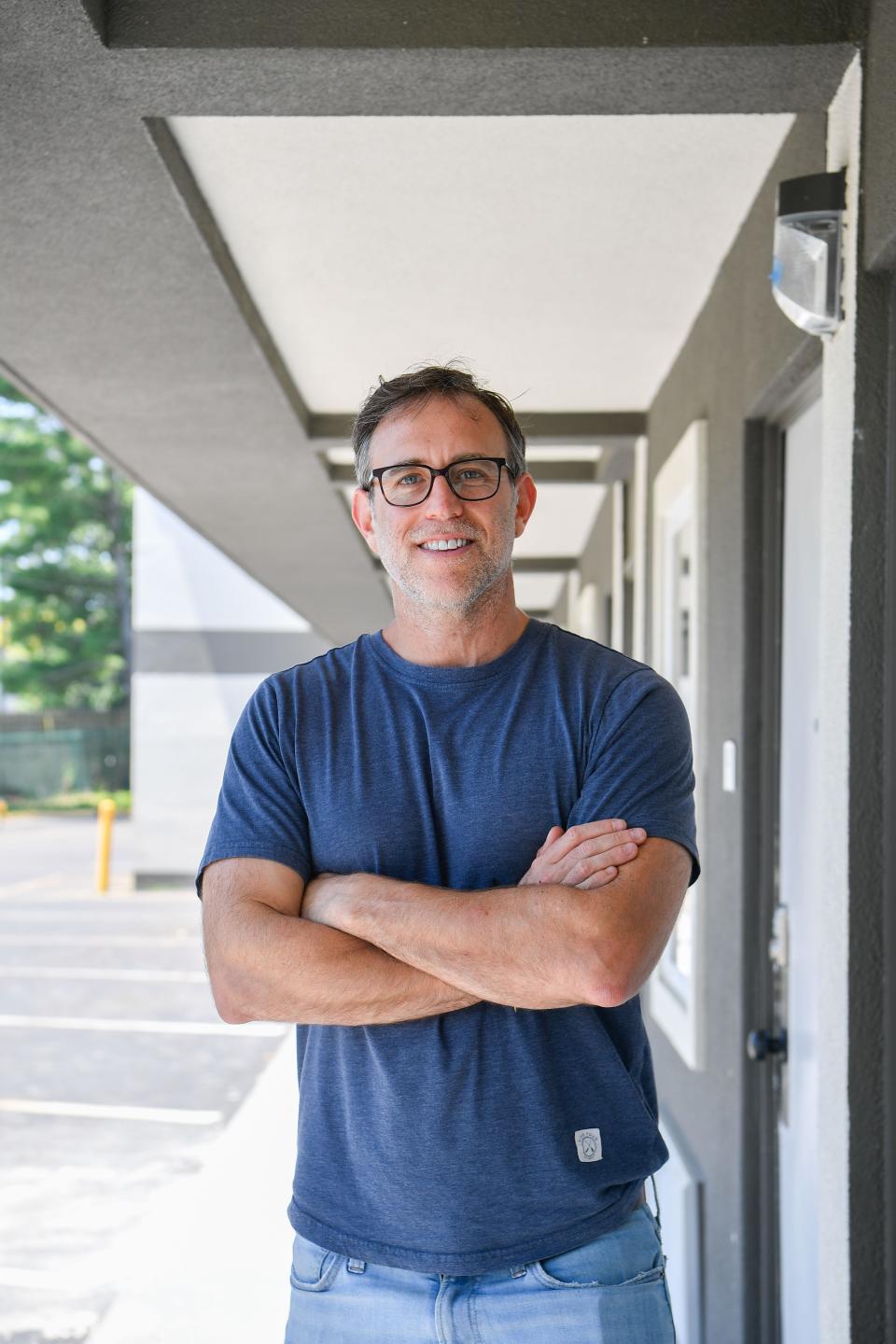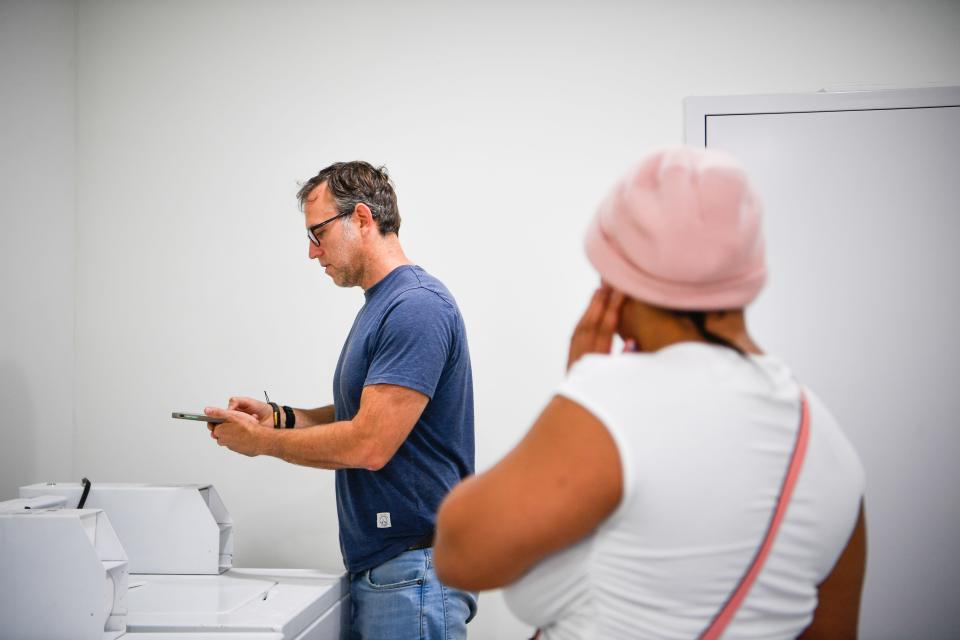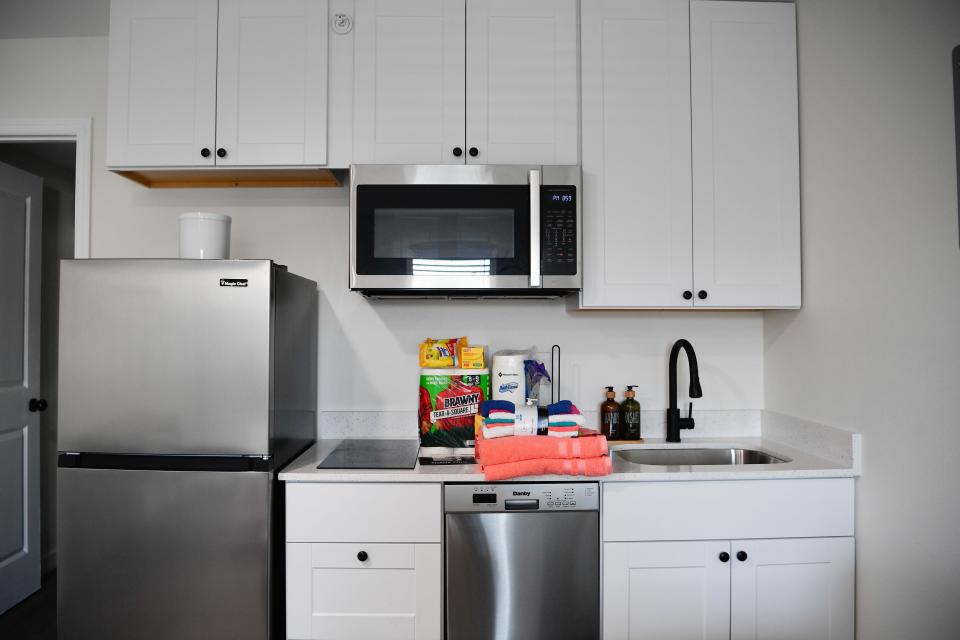When Karen Brimer lived at the Nashville Rescue Mission homeless shelter — for two years, two months and two days, exactly — her life revolved around simple goals: finding food and a place to sleep.
That all changed in May.
Walking into her fully-furnished Wallace Studios apartment with conveniences like toilet paper, washcloths, paper towels and a supply of food waiting on the kitchen counter, Brimer was overcome with pure joy. For her, suddenly having access to a stove, microwave and dishwasher was a culture shock.
“You don’t realize when you’re coming from a place like the mission or the streets what exactly you’re going to need to survive,” she said. “And to have some of this stuff already here and waiting for you was wonderful.”
Brimer’s new Wallace Studios home, in a former 1970s-era motel in southeast Nashville, is part of a unique affordable housing project developed by AGB Real Estate. It’s one of a growing number of creative redevelopments of old abandoned buildings across the region.
The apartments at 97 Wallace Road are some of the rarest, most in-demand in the city because they are open to very low-income residents who have federal Section 8 vouchers, like Brimer, allowing them to pay rents capped at about 30% of their income.
Wallace Studios developer Adam Rosenberg is one of many in the real-estate industry who are re-examining Nashville’s affordable housing crisis by repurposing vacant or underused buildings. Hotel-to-apartment conversions, known as adaptive reuse in the architectural world, are the most cost-effective and efficient options, while offices are more difficult to repurpose because of the large floor plans and lack of windows.
“Adaptive reuse in development allows developers to quickly and more efficiently — from a materials perspective, as well as a capital-intensity perspective — bring affordable housing to the market, in a much less expensive way,” Rosenberg said. “And those things matter to the people that are moving here, and also to us as developers.”
There are an estimated 969 new apartments slated for “adaptive reuse” in Nashville, to be transitioned into a new life apart from their former use, according to a RentCafe study.
Office-to-apartment conversions are also increasingly popular, though more difficult to redevelop, because of the growing number of vacant offices as the popularity of remote work remains strong post-pandemic. In Nashville, about one in every five offices was vacant in late 2023.
How the Wallace Studio Apartments came to fruition
Rosenberg founded his development company, AGB Real Estate, in 2021 with the goal of transforming underutilized buildings in growing communities into multifamily housing.

He actively oversees two conversion properties outside of downtown Nashville, completing full-gut renovations in roughly 10 months. In June 2022, he secured a 108-unit former Rodeway Inn to develop Hermitage Studios and, a year later, in August 2023, purchased a 126-unit former America’s Best Value Inn to become Wallace Studios.
While Rosenberg developed both complexes to address Nashville’s lack of affordable housing, he envisioned the Wallace Studio apartments as a solution to another city issue: homelessness.
Inspired by former Major John Cooper’s $50 million homelessness plan, Rosenberg contacted the Metropolitan Development and Housing Agency, Nashville’s housing authority, to understand the housing market needs.
With help from the U.S. Department of Housing and Urban Development’s Section 8 Housing Choice Voucher Program, Rosenberg provides $1,400 rent vouchers for tenants of zero and low-income.
Wallace Studios residents include former homeless individuals, those who have aged out of foster care and those who have lived in public housing and veterans.
The $1,400 monthly rent covers utilities, on-site laundry, Wi-Fi and extensive wraparound services.

Rosenberg and his team considered what essential services his tenant population would need by speaking with city specialists, such as the Office of Homelessness Services, Veterans Affairs, The Mary Parrish Center and the Community Care Fellowship.
“In advance of opening Wallace Studios, we created relationships and partnerships with Neighborhood Health, which brings a van where they provide medical assistance [and] dental care to our tenants here,” Rosenberg said. “If more is needed, there’s a clinic about a mile down the road, so they can go there to see it free of charge.”
Other service providers include One Generation Away, which stocks the pantries and welcoming items for tenants to have when they move in; The Store, Brad Paisley’s nonprofit, where tenants can shop twice a month for free; and a Mental Health Cooperative peer support specialist who lives on-site to counsel and advocate for the residents.

Brimer has zero income and relies on food stamps and The Store for her monthly groceries.
“This is the model to use because he’s got it right. And you have to work with outside sets of people [and] different companies to get it right,” she said. “You can’t be an island. You have to work with other community folks to get it right. And he’s got it right. I’m thoroughly impressed with this place.”
The first two weeks living in her apartment, Brimer was in the managing office “just about every day” with suggestions to improve the property. From personally buying shower curtains for those who can’t afford it to upgrading security systems for tenants to feel safe, Brimer says Rosenberg has taken care of it all, and she hasn’t been to the office with a complaint in a month — well, except for the lack of storage space, but he’s working on it.
“I’m recommending [Wallace Studios] to everybody I can get my hands on,” she said.
With AGB Real Estate planning for another motel redevelopment on Murfreesboro Pike, which will also operate under the HUD voucher program, Brimer is leading her friends from Nashville Rescue Mission in Rosenberg’s direction.
Hotel conversions on the rise in Nashville and nationwide
Hotel building conversions in 2023 made up 36% of reuse projects nationwide, according to an analysis from RentCafe. That’s a 39% uptick from the previous year. Office building conversions made up 28% of reuse projects. Last year was the first time hotel conversions surpassed former office building projects.
According to Doug Ressler, senior analyst at Yardi Matrix, RentCafe’s sister company, there are more prospective projects on the horizon in Nashville, especially when it comes to hotel to apartment conversions suitable for affordable housing.
“What people are finding is that its much more available to configure hotels to one bedroom or studio-type apartments for workforce housing,” Ressler said. “From a cost standpoint, they can be offered at a price point people can afford. That’s happening in many cities across the board.”
Older hotels and motels used for conversions are also often located along high-traffic corridors that are more likely to offer access to public transportation.
Office conversions can be successful on a case-by-case basis, Ressler said, but don’t always lend themselves to creating affordable units because of the high cost of renovations. In isolated office parks, developers need to bring services to make the conversion viable, like grocery stores, retail and childcare facilities.
‘This is everything I’ve wanted’
Brian Hubbard, senior design director at Gensler architecture firm, is currently working on three Nashville office-to-hotel conversion projects. While new hotels do well in Nashville because of the booming tourist population, repurposing old hotel properties is ideal for creating affordable housing, he said.
Motel-centric properties have the existing plumbing and electrical elements necessary to transition smoothly into residential housing, Hubbard said. Additionally, as Ressler mentioned, office spaces aren’t as accessible to livable services, but hotel locations are.
“It’s the location that allows you to have that affordability aspect. The whole idea of having to have a car to get around Nashville inherently drives your daily cost,” Hubbard said. “So, if you’re able to live and work and play in an area where you don’t need a car, you have other city attributes at your feet and fingertips like your buses, your scooters, your bikes and everything else that allows you to lower that initial cost of living.”
Listing prices on Zillow and rising rents on Apartments.com are not the only factors to consider when addressing affordable housing. With 15 years of global design experience, Hubbard approaches design with a holistic perspective, looking beyond the numbers and into lifestyle.
Instead of building new housing out in the suburbs, Hubbard sees the potential for adaptive reuse of downtown Nashville properties as an opportunity to foster a community accessible to people with a range of incomes.
“I think [adaptive reuse projects] bring life back to an area where maybe an office building is now vacant and you’re bringing life back to the space,” he said. “I think it gives opportunity for people to live in a location that is desirable — a spot that allows them to have a full experience of a city.”
Since moving into Wallace Studios, Brimer indulges in hobbies beyond the basic needs for survival.
Colorful cross-stitch designs of Disney’s Sleeping Beauty and various forest animals are displayed around her apartment. She enjoys reading, watching TV and the freedom to walk out her door after 6:30 p.m., which would be curfew at the homeless shelter.
“The sun was going down and it was 7 p.m. and I’ve walked outside and I’m like, ‘I’m outside after dark,'” she said smiling with her arms out wide. “Outside after curfew. I’m able to watch the sunset, and I was able to watch it go down. It was just a joy. Something so simple as being able to do that was such a joy, but it was something I never thought of until I got here.”
Rosenberg not only developed affordable housing for his tenants to survive, but to create environment for them to enrich their lives.
“I know a lot of people will use this [Wallace Studios] as a steppingstone. I’m going to stay here as long as he and Section 8 let me stay here,” she said. “I plan on being here because this is everything I’ve wanted.”
This article originally appeared on Nashville Tennessean: Nashville Wallace Studios provides new hope for homeless people
Signup bonus from





